- Home
- Anne Easter Smith
This Son of York Page 31
This Son of York Read online
Page 31
“How many men died at Barnet?” she whispered. “Was there anyone I knew…” She had been afraid to ask earlier in case she recognized names. “…Jack Howard? My father-in-law?”
“All in all more than one thousand fell,” Richard said, his heart heavy from all the carnage. “But Jack Howard lives to fight another day. I promise to enquire about Martin Haute for you.”
He rolled onto his back and stared into the darkness, Kate tucked in the crook of his arm. His mind could not help but return to Warwick. “Poor Anne,” he whispered. He felt Kate stiffen.
“Why spoil our time together, Richard,” she complained. Anne Neville’s name had come up before in their infrequent meetings, and Richard had admitted that for some time he had considered making Warwick’s daughter his wife. “Why must you always mention her name? You know how much it hurts me.”
At once contrite, Richard turned on his side and pulled Kate to him, careful to protect his arm. “I have always been honest with you, Kate. You know that my duty is to wed…”
“I know, I know—‘someone of my rank.’ But it does not hurt any the less to know that one day you will have to give me up.” A note of pleading came into her voice. “You would not have to, in truth, even if you were married.”
Richard sighed. “You know me well by now, sweet Kate. You know that cannot be.”
“Aye. Your morality will not allow a mistress, will it? Sweet Jesu, sometimes I wish you were not so God-fearing!” She stroked his cheek and sighed. Then she giggled. “We shall just have to make the most of our times together, won’t we? And thank the Almighty for sending Edouard to wed Anne, which will delay our parting—at least until someone else acceptable comes along.”
Richard pulled her close. “Until then, my dearest rose.”
Every scrap of clothing Richard wore was thick with the dust kicked up by four thousand men marching at double quick time in pursuit of the enemy. This time it was the Yorkists’ original enemy, Margaret of Anjou and her commanders, Somerset, Lord Wenlock, the earl of Devon, and her son, Edouard.
“My crown is not safe unless we prevent the She-wolf joining forces with Tudor in Wales,” Edward had said to his own commanders upon hearing the news that Queen Margaret had landed in the west country and was gathering men to her banner in that Lancastrian part of the kingdom. He sent out commissions of array to fifteen counties, and by the time his army marched out of Windsor on the twenty-fourth day of April, he had amassed a considerable force. History would show that Edward acted decisively and with intelligence in his bid to thwart Margaret’s effort to reclaim the crown for her husband and son.
By this time, Edward’s troops would have followed their magnificent leader into the regions of Hades, and at the wicked pace up and down the Cotswold Hills, they had an inkling of what those hellfires must be like. Both armies raced against time—Margaret to cross the Severn somewhere and find safety in Wales, and Edward to stop her. Although on horseback, Richard often chose to dismount and march alongside his tired and thirsty men. Rob teased his friend: “Why must you show yourself no better than they? The common folk probably think you are as foolish as I do.”
On the evening of the third day of May, after a grueling thirty-six miles, the royal army camped a few miles south of where the Lancastrians had taken up a defensive position near Tewkesbury. The only way to cross the Severn was a ford that was tantalizingly close.
“Gloucester, you will command the van,” Edward told his brother, as they studied his battle strategy. He once again excluded George, who pretended nonchalance. “George you will ride with my center, and Lord Hastings has the right flank. Aye, we are tired, but the enemy is more so—my spies tell me they have marched relentlessly for a full day and a night. And thanks to my commanding the constable of Gloucester to refuse them entry, they have had no supplies since Bristol. We shall have the edge.” He drummed his fingers on the table, making the small pieces of wood representing his divisions jump up and down. “You know our aim: we must remove the threat to the crown permanently. We must kill or take Edouard of Lancaster or there will never be peace.” He leveled his gaze at each of them in turn until they nodded. “Now get some sleep,” he ordered.
Richard and George left the tent together. “You know I could command as well as you, don’t you?” George said.
Arrogant prick, Richard thought. “Aye, I do not doubt you think that, George, but you have no one to blame but yourself, and I cannot pity you. Do you blame Edward for wanting to keep you close? To me you are no less a traitor than Warwick.” He strode off to his own tent.
George glared after his younger brother. “Runt,” he muttered, “and a deformed runt at that.”
The battle of Tewkesbury, with the magnificent abbey standing sentinel a half mile away, was a decisive but bloody climax to the quarrel between cousins. Edward’s four thousand Yorkist soldiers crushed Lancastrian Henry’s five thousand commanded by the duke of Somerset.
Once again, Edward owed much of the triumph to his youngest brother, Richard, whose force at first was taken by surprise by Somerset. But Richard held on valiantly, thanks to some two hundred spearmen concealed in a copse to his left, who at his command suddenly emerged from cover and scattered Somerset’s right flank. As the fleeing Lancastrians raced for sanctuary in the abbey, George and some of his men caught and killed young Edouard, giving George something to crow about and earning Edward’s gratitude.
“He whimpered like a pup,” George told the group gathered around Edward when the fighting was over. “He cried for his mother, poor baby. I killed him in revenge for Edmund.”
“Good for you, George,” Edward said. “But now, we must find Somerset.”
Richard caught George’s eye and acknowledged the revenge with a respectful nod before following the king and others in a search for the Lancastrian leaders. Most had taken sanctuary, but Edward, uncaring of his mortal soul, had them dragged out of the church and put in chains. This time Somerset and his cronies could expect no mercy from Edward, who had pardoned them for previous rebelling. Subsequently the next day, Richard, as constable of England, together with the earl marshal, Norfolk, tried them all for treason and had them executed in the town square. Richard stayed to watch, his heart hard, as one by one the heads rolled. “They should be shown no mercy,” he told Edward. “Not this time.”
His victory complete and his throne secure, Edward could afford to be magnanimous. He prohibited the rebels’ bodies to be quartered and exhibited in public places as was customary but instead had them buried in the churchyard. In deference to his rank, their prince, Edouard, was entombed in the abbey’s nave.
“This business is not finished until we find Margaret,” Edward declared, “but we go north from here. There is more trouble brewing.”
Richard wearily climbed back into the saddle and joined Edward on the road to Coventry. He was not so much thinking about Margaret as wondering what had become of Anne, who was last known to be in the deposed queen’s company. It had occurred to him the night before, as he lay under the stars unable to sleep, that she was now a widow and free to remarry. Despite her childish peskiness at times, he remembered her fondly. They had liked each other then, but would she want him now? Had she loved Edouard in the end? He even wondered if she might be with child. He had sat up then with a “nay!” on his lips. She was not even fourteen, he recalled, so surely the marriage could not have been consummated. And yet…I was only fifteen when Kate conceived our very first time.…Then he had a more disturbing thought about Anne’s possible pregnancy: Her child would be the Lancastrian heir and mean Edward’s hard-fought victory at Tewkesbury would have been for naught. He wondered if Ned had contemplated such an unpropitious circumstance, and if so, would the child even be allowed to enter a Yorkist world. In truth, he thought not. Time alone would tell.
Richard would never forget the triumphant entry into London on the twenty-first day of May, for Edward had given Richard the supreme honor of leading the processio
n. Londoners were greatly relieved that Edward’s victory at Tewkesbury had also put paid to the recent Lancastrian attacks on their city. With news that northern dissent had also dissolved with the intervention of the earl of Northumberland, there was nothing or no one now to stand in Edward’s way of reclaiming his throne. Tower-bound King Henry had no one to rescue him now.
With Richard rode William Herbert, earl of Pembroke, who had also distinguished himself at Tewkesbury. The two men were about the same age, and Herbert would become a staunch supporter of Richard’s in the years to come. The roar of the crowd as they emerged from under the Bishopsgate caused their horses to shy and the pair exchanged surprised grins at the cheering throngs.
The colorful cavalcade was pelted with flowers—mostly white roses—and the air was filled with clarions and trumpets and the ear-stopping roar of “God save the king,” almost drowning out the pealing of hundreds of church bells. Riding in full armor upon a colossal gray courser and carrying a vicious war hammer, Edward’s majesty was almost mythical. It was as though Thor himself had come amongst them, although no one still believed in the old pagan gods.
Somewhere behind his brothers, George sulked, once again eclipsed by Richard at the head of the procession, and his resentment grew.
It was then Richard saw Kate at the front of the crowd, John clinging to her neck, and Molly holding Katherine by the hand. The little girl was jumping up and down with excitement, and his heart leaped at the sight of his little family. Kate took John’s hand and waved at Richard, who grinned back at her.
“Who is that?” Herbert asked. “She seems to know you.”
“She is an acquaintance of Margaret Howard’s ’tis all. I met her at Tendring,” Richard said with a shrug. A pang of guilt assailed him as he watched Kate. Could he not even acknowledge her or his children to William, who probably had a mistress of his own? He grimaced. What a coward!
But his guilt had more to do with his all-consuming thoughts about Anne Neville at the present moment, which he knew would hurt Kate far more than pretending to Pembroke she meant nothing to him. Once Margaret of Anjou and Anne had been captured following the battle, Richard had been relieved to discover that Anne and Edouard’s marriage had not been consummated. Not only would there be no rival heir, but Anne was free to marry again and would need a husband. Richard was now determined to woo and win her. Soon, his time with Kate would come to a close.
Without warning, there was a change in the crowd’s mood, and jeering replaced the cheering. “It must be for the She-Wolf,” Richard muttered, sorry that he had not prevailed to have Anne ride separately from the erstwhile queen. How shrewd of Edward to include Margaret in the procession, he thought. I warrant she wishes the carriage curtain sides were rolled down. He also wondered if George were wishing himself far away from his former ally. What would have been his fate had he continued to throw in his lot with Margaret of Anjou?
“I wonder if she will be allowed to reside with Henry in the Tower,” Richard mused aloud. “She needs to be locked up on a remote island somewhere and the key thrown in the sea. As for poor Henry, he will never be a danger to anyone as long as Margaret is under lock and key.”
“I do not pity the man,” Herbert said. “He was good for nothing.”
Richard nodded. “He should have been a monk. He told me so himself. My wish for him is that he may while away the rest of his days in prayer.”
“Amen to that,” Earl William replied, smirking.
“Are you certain, Your Grace?” Richard tried to steady his voice, but he knew it wavered. “You are commanding me to order regicide—and indeed to commit my soul to the devil.”
Edward glared at him, his mouth set in a tight, straight line, his fingers gripping the arms of his throne. “You are constable of England, are you not, my lord of Gloucester? I seem to remember your having no qualms about accepting that honor.”
“I am, Your Grace,” Richard replied, quickly organizing his thoughts, “but I understood my duty is to bring the accused to trial and, upon that person being found guilty, to mete out an appropriate punishment. May I ask the nature of Henry’s crime, and how long will I have for a fair trial?”
It was a bold rebuttal to Edward’s appalling command to rid England of Henry and the Lancastrian line. Richard could not believe his brother’s request, and although the others in the small, secret council nodded, they would not lift their eyes from the floor. Even Archbishop Bourchier did not condemn the order. What a lickspittle, Richard thought angrily, and a hypocrite. He looked at George to see if he perhaps would stand up to their brother, but of course George had every reason to acquiesce. Nay, George was not going to risk provoking the king again. Richard’s only hope was Will Hastings, but he seemed to have found a wayward thread on his elegant sleeve and was busy trying to break it off. Besides, Will had possibly suggested the outrageous solution. Richard was on his own. How he pitied the former king. He had been saddened by the grief Henry had expressed upon learning of his only child’s death. In truth, what does he have to live for, Richard thought now.
“There will be no trial, Richard,” Edward answered. “As constable you have the right to administer punishment without one. You will arrange to end Henry’s life in the kindest and most discreet way possible. I want no signs of violence upon the body, do you understand. It must look like natural causes. Use money from the privy purse if you have to, but you will do it tonight.” He rose from the chair and towered over his brother. “I am the one whose soul may see hellfire, not you. You have but to obey an order from your king—the Lord’s anointed. For the peace of the kingdom, I must sometimes act in God’s place.” Then putting his hand on Richard’s arm, he said, “Come, let us pray together for you to have strength to do was is right for England.”
“I don’t need your prayers,” Richard snapped, shaking off the unwanted hand. “Save them for yourself, Your Grace.”
It was with heavy legs and an equally heavy heart that Richard climbed the spiral staircase to Henry’s apartment in the Tower. Richard had had no trouble finding an assassin within the Tower dungeons to carry out Edward’s bidding, and with a promise of freedom and a few guineas, the unsavory-looking man was now keeping a respectful distance behind his savior.
Upon seeing Richard, the guard outside King Henry’s room unlocked the door and bowed. “Wait downstairs for me,” Richard commanded, taking the flambeau from its sconce, and the turnkey gladly sauntered off, hardly giving the other man a glance.
The former king was housed in a large, well furnished room and was lying in the bed, a black velvet blanket covering his thin frame. He almost looks like a corpse already, poor man, Richard thought, ashamed. Could his prayer have been answered so soon? He had spent the past hour on his knees in the Tower’s chapel trying to think of a way out of this dreaded responsibility, and begging God to simply strike Henry down with some natural cause.
Henry’s eyes flew open at the light and locked on to Richard’s troubled ones. As Richard secured the torch, Henry suddenly saw the ruffian in Richard’s shadow. The man was clutching a cushion from the only chair, and the king blanched. “So is that the way of it?” he asked so quietly he unnerved the already-tense Richard. “I am a nuisance and must be eliminated. Is that it?”
Richard could not lie. “Forgive me, Your Grace. I am but my brother’s messenger,” he murmured. “If I had my way, you would be allowed to end your days in a monastery. I hope you believe…”
“Enough talk!” the assassin hissed and lunged at the bed, shoving the drowsy king back down and pushing the cushion onto Henry’s face. It was a clumsy attempt at suffocation, and Richard had cringed when he had instructed the convict in the manner of the murder. “No wounds,” he said. “We shall hope he is asleep and you can smother him quickly.” He could not believe he was subjecting gentle Henry to his own worst nightmare, and the bile rose sourly. He stepped back and turned his face away. He wanted to run, or at least leave the room and the murderer to his bu
siness, but he knew he must not. He must witness this heinous, unnatural execution.
But it seemed Henry would not exit this life as weakly as he had lived it. His body, now desperately awake, took on superhuman strength and began flailing wildly and clawing at the pillow and his killer. Richard knew exactly what Henry was experiencing and involuntarily gasped for air.
“Good Christ Almighty!” the hoodlum cried, fighting off the terrified king’s blows and scratches. “You told me he’d be asleep and weak.” He tried in vain to hold the cushion in place. “Hold still, you feeble-minded bastard!”
Richard could bear the scene no longer. What a hideous way to die, he raged inside. Henry did not deserve to be so ignominiously treated, and with great force he grabbed the felon by the scruff of his neck and threw him out of the room, slamming the door shut. “You have your freedom,” Richard shouted, “now go to hell.”
He could hear the man trip and stumble down the stairs as he turned to face Henry, who was now on his knees, eyes turned to heaven. Only his torn chemise, shallow breathing, and disheveled, lank hair gave proof to what had just happened. What impressed Richard most was Henry’s calm: he had his rosary between his fingers and was telling the black beads as though nothing had happened.
It was in that quiet but ghastly instant Richard knew what only he must do—and, moreover, quickly and cleanly. He moved behind Henry and put his hands on the king’s shoulders. Only then did Henry tremble.
“Lord God Almighty, take me to Your bosom quickly,” the condemned man whispered, “for I have no wish to live in a world without my kingdom, queen or son. And forgive this man his transgression as I forgive him.”
With tears very close, Richard took Henry’s head between his hands, the head that had once worn the crown of England, and snapped the thin neck with surprising ease. “Good man that you were, may you now rest in peace.”

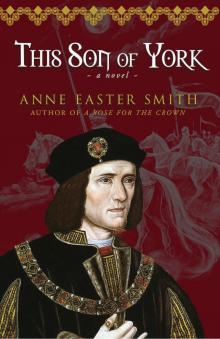 This Son of York
This Son of York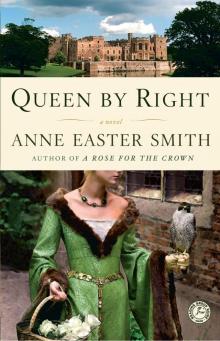 Queen By Right
Queen By Right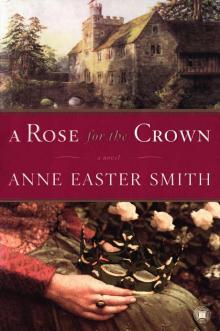 A Rose for the Crown: A Novel
A Rose for the Crown: A Novel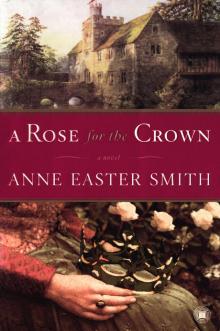 A Rose for the Crown
A Rose for the Crown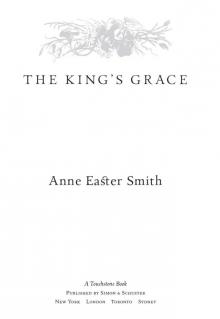 The King's Grace
The King's Grace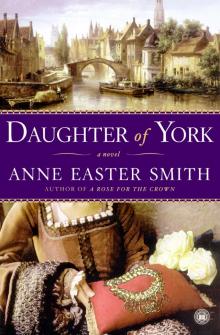 Daughter of York
Daughter of York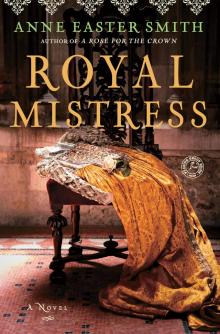 Royal Mistress
Royal Mistress